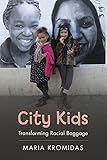City Kids : Transforming Racial Baggage / Maria Kromidas.
Material type: TextSeries: Rutgers Series in Childhood StudiesPublisher: New Brunswick, NJ : Rutgers University Press, [2016]Copyright date: ©2016Description: 1 online resource (196 p.) : 1 figure, 2 tablesContent type:
TextSeries: Rutgers Series in Childhood StudiesPublisher: New Brunswick, NJ : Rutgers University Press, [2016]Copyright date: ©2016Description: 1 online resource (196 p.) : 1 figure, 2 tablesContent type: - 9780813584782
- 9780813584812
- Ethnicity in children -- New York (State) -- New York -- Case studies
- Multiculturalism -- Study and teaching (Elementary) -- Case studies
- Race awareness in children -- New York (State) -- New York -- Case studies
- Race -- Study and teaching (Elementary) -- New York (State) -- New York -- Case studies
- SOCIAL SCIENCE / General
- cosmopolitan, race, racial, racial diversity, culture, cultural diversity, urban, urban life, city life, multicultural, cosmo, stereotype, racist, racism, children, youth, child, learning, development, adolescence, parenting, kids, antiracism, teaching, diversity, discipline
- 305.8009747 23
- GN495.6 .K76 2016
- online - DeGruyter
- Issued also in print.
| Item type | Current library | Call number | URL | Status | Notes | Barcode | |
|---|---|---|---|---|---|---|---|
 eBook
eBook
|
Biblioteca "Angelicum" Pont. Univ. S.Tommaso d'Aquino Nuvola online | online - DeGruyter (Browse shelf(Opens below)) | Online access | Not for loan (Accesso limitato) | Accesso per gli utenti autorizzati / Access for authorized users | (dgr)9780813584812 |
Browsing Biblioteca "Angelicum" Pont. Univ. S.Tommaso d'Aquino shelves, Shelving location: Nuvola online Close shelf browser (Hides shelf browser)

|

|

|

|

|

|

|
||
| online - DeGruyter The Dominican Racial Imaginary : Surveying the Landscape of Race and Nation in Hispaniola / | online - DeGruyter Gangsters to Governors : The New Bosses of Gambling in America / | online - DeGruyter Searching for Sycorax : Black Women's Hauntings of Contemporary Horror / | online - DeGruyter City Kids : Transforming Racial Baggage / | online - DeGruyter Dads, Kids, and Fitness : A Father's Guide to Family Health / | online - DeGruyter Manhood Impossible : Men's Struggles to Control and Transform their Bodies and Work / | online - DeGruyter Why Afterschool Matters / |
Frontmatter -- CONTENTS -- ACKNOWLEDGMENTS -- TRANSCRIPTION CONVENTIONS -- INTRODUCTION. The Transformative Politics of Learning Race -- 1. SENSING URBAN SPACE -- 2. LOVING FRIENDS AND THINGS -- 3. THE COLLECTIVE LABORS OF CONVIVIALITY -- 4. RACIST OR FAIR? -- 5. ENACTING SEX ED -- CONCLUSION. Out of the Heart of Whiteness -- Notes -- References -- Index -- ABOUT THE AUTHOR
restricted access online access with authorization star
http://purl.org/coar/access_right/c_16ec
Cosmopolitanism-the genuine appreciation of cultural and racial diversity-is often associated with adult worldliness and sophistication. Yet, as this innovative new book suggests, children growing up in multicultural environments might be the most cosmopolitan group of all. City Kids profiles fifth-graders in one of New York City's most diverse public schools, detailing how they collectively developed a sophisticated understanding of race that challenged many of the stereotypes, myths, and commonplaces they had learned from mainstream American culture. Anthropologist Maria Kromidas spent over a year interviewing and observing these young people both inside and outside the classroom, and she vividly relates their sometimes awkward, often playful attempts to bridge cultural rifts and reimagine racial categories. Kromidas looks at how children learned race in their interactions with each other and with teachers in five different areas-navigating urban space, building friendships, carrying out schoolwork, dealing with the school's disciplinary policies, and enacting sexualities. The children's interactions in these areas contested and reframed race. Even as Kromidas highlights the lively and quirky individuals within this super-diverse group of kids, she presents their communal ethos as a model for convivial living in multiracial settings. By analyzing practices within the classroom, school, and larger community, City Kids offers advice on how to nurture kids' cosmopolitan tendencies, making it a valuable resource for educators, parents, and anyone else who is concerned with America's deep racial divides. Kromidas not only examines how we can teach children about antiracism, but also considers what they might have to teach us.
Issued also in print.
Mode of access: Internet via World Wide Web.
In English.
Description based on online resource; title from PDF title page (publisher's Web site, viewed 30. Aug 2021)


